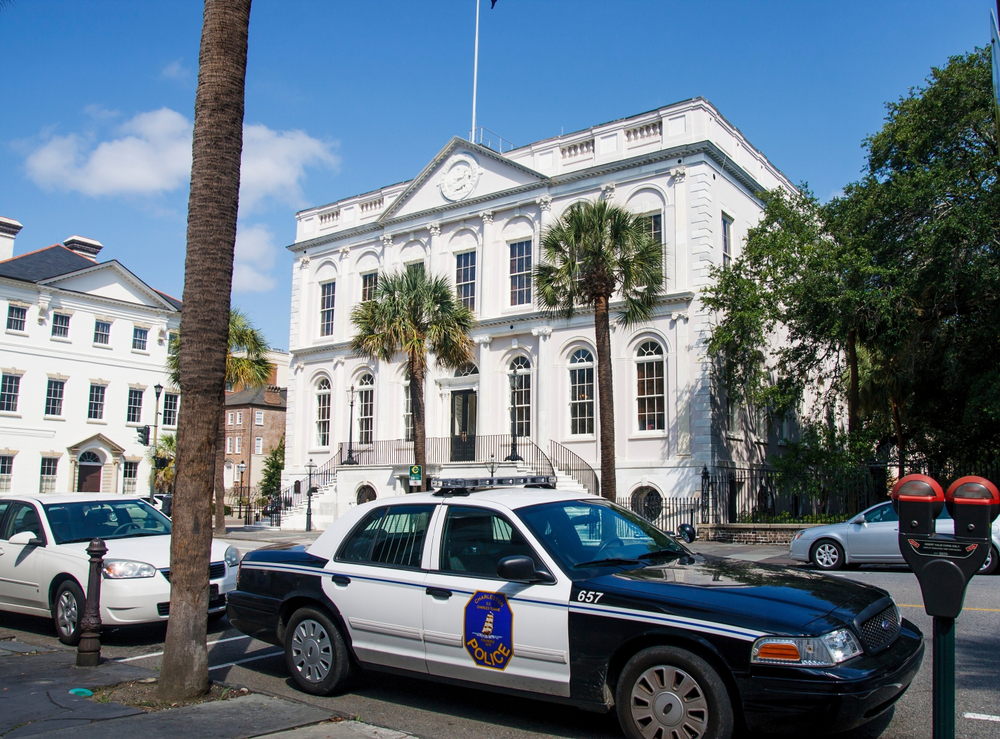Civil Asset Forfeiture: Explanatory Stories and Essential Sources
Mikee Albin was a 65-year-old Vietnam veteran. He was living in an RV in the parking lot of the restaurant he ran, hoping to build up the business and achieve the American dream of entrepreneurship and homeownership. But his dream was sidetracked…badly sidetracked.
Following an undercover investigation at his restaurant, where it was determined that his cook sold a small amount of marijuana to an undercover officer, police searched the entire property, including Albin’s RV. In the vehicle, law enforcement found a trace amount of marijuana, causing them to declare the RV a “container” used in drug trafficking. They seized it. Although the cannabis found in the camper fell well below the legal threshold for vehicle seizure, and even though the veteran was not found guilty of a crime, Albin’s property was seized and sold at auction, the proceeds benefiting the police department.
During the lengthy legal process to recover his rightful property, Albin passed away before the court overturned the seizure, leaving his estate with significant legal fees and a fraction of the RV’s value. This true story took place right here in South Carolina, and it highlights the dark side of what is known as “civil asset forfeiture.”
WHAT IS CIVIL ASSET FORFEITURE?
Civil Asset Forfeiture is a legal process that allows law enforcement to seize assets connected to illegal activities. Problems arise, however, when assets are seized by law enforcement in the absence of a criminal conviction. Many find their property taken and never returned, even after charges are dropped. South Carolina is notorious for its forfeiture rates that are among the highest in the nation. In 2020, Palmetto State law enforcement sized $141 million in assets. That same year, California and New York–states with much higher populations than South Carolina–seized only $19 million and $12 million respectively.
Clearly there is a problem. Legal and policy researchers at the Institute for Justice gave South Carolina’s forfeiture laws a grade of D-. Earlier in 2024, South Carolina made national news for our predatory forfeiture laws. “Taken,” an investigative report that ran in The Greenville News also received widespread national attention.
WHY ALLOW FORFEITURE?
In the interest of considering both sides of the argument, let’s look at several arguments in favor of South Carolina’s current asset forfeiture system.
First, forfeiture serves as a deterrent. It punishes criminals by stripping them of their ill-gotten gains, thereby reducing their incentive to engage in illegal activities. Forfeiture disrupts criminal organizations by depriving them of their financial resources, making it more difficult for them to operate and expand.
Civil Forfeiture also provides victims with the opportunity to regain their goods or receive compensation. Forfeiture ensures that justice is restored and victims receive closure for the harm they have suffered. Furthermore, forfeiture shifts the burden of proof from prosecutors to defendants, making it easier for authorities to prosecute criminals and seize their illegal assets.
Finally, asset forfeiture can be a regular revenue source for our local law enforcement agencies who are our first line of defense against dangerous criminals.
HOW IS SC LAW ENFORCEMENT FUNDED?
South Carolina police and sheriff’s departments receive their funding primarily from local governments, with property taxes being a significant source of revenue. State appropriations and federal grants contribute to their budgets as well. Specific funding streams vary between departments, with some departments receiving additional revenue from fines and asset forfeiture. Here is a breakdown of those sources:
Local Government Appropriations: This is the main source of local law enforcement funding (municipal police and county sheriffs), with property taxes being a significant contributor. Local governments determine the amount allocated to police and sheriff’s departments based on budget priorities and community needs.
State Appropriations and Grants: The South Carolina Department of Public Safety (DPS) details how state appropriations are allocated to various law enforcement agencies as does the Governor’s Executive Budget Summary FY 2023-24. The State of South Carolina provides supplemental funding to police and sheriff’s departments through various grant programs. These grants may fund specific initiatives, such as crime prevention, technology upgrades, or officer training. Every year, the state budget appropriates funds to local law enforcement agencies.
Federal Appropriations and Grants: Federal funding opportunities are available to law enforcement through competitive grant programs offered by agencies like the Department of Justice (DOJ). These grants support a wide range of activities, including narcotics enforcement, community policing initiatives, and equipment acquisition. Examples of federal law enforcement grants can be found here. Data on South Carolina policing grant funding can be found here.
Forfeited Assets: Proceeds from forfeited assets can be used to fund law enforcement operations, improve training, equipment, and salaries. This additional funding enables law enforcement to more effectively combat crime and enhance public safety.
THE PITFALLS OF CIVIL ASSET FORFEITURE
South Carolina’s current civil asset forfeiture laws present a significant threat to individual liberties and property rights. This system allows law enforcement agencies to seize property without a criminal conviction, placing an undue burden on innocent individuals to prove their innocence. Such a practice is fundamentally unjust and undermines the core principles of our legal system. Unlike in a criminal proceeding, under civil forfeiture, law enforcement merely needs to establish probable cause that the property was involved in illegal activity. This low standard of proof can lead to innocent individuals losing their hard-earned possessions based on mere suspicion. The burden then shifts to the property owner to prove their innocence (“guilty until proven innocent”), a daunting task that can be both costly and time-consuming.
Moreover, the incentive for law enforcement agencies to seize property under civil forfeiture can be significant, as the proceeds are often retained for agency use. This creates a potential conflict of interest that can lead to abuses of power. To protect individual rights and ensure a fair legal system, South Carolina should transition to a criminal asset forfeiture standard. This would require law enforcement to obtain a criminal conviction before seizing property. Such a standard provides greater safeguards against wrongful seizures and ensures that individuals are not punished without due process.
The South Carolina General Assembly should move the Palmetto State from civil asset forfeiture to criminal asset forfeiture. Legislation authored by former prosecutor Rep. Tommy Pope (R-York) was marked up in a subcommittee in the 2021-22 General Assembly, but unfortunately, it did not receive enough support to clear the committee,
South Carolina’s adoption of criminal asset forfeiture would align with federal law and practices in numerous other states. This consistency in forfeiture laws would enhance cooperation and strengthen the overall fight against crime.
FOR FURTHER READING
The links below are meant to serve as a resource guide for citizens and legislators interested in civil asset forfeiture and why South Carolina must act to reform this unjust practice.
South Carolina Code of Laws
Key Recent SC Bills Relating To Asset Forfeiture Reform:
S.41 (Senator Campsen). Shifts to Criminal Asset Forfeiture.
H.3619, 124th General Assembly. Reps. Pope, McKnight, G.R. Smith, Wheeler, Simrill, Rutherford, Lucas, Dillard, Erickson, Hart, Hyde, Kimmons, Murphy, W. Newton, Stavrinakis, Thigpen, Bryant, Taylor, Bamberg, Willis and Jones. Criminal Asset Forfeiture Act. This bipartisan bill enacting a new code section, Title 17, Chapter 32, received hearings and generated revisions but lost momentum in the mid-COVID legislative session (2021-22).
H.3307, 123rd General Assembly (Reps. Clemmons, Fry, Crawford, Allison, Yow, Daning, Elliott, Hewitt, G.R. Smith, Hixon, Taylor, Magnuson, Gagnon, Johnson, Clary, Pendarvis, McKnight, Rose, Cogswell, Cobb-Hunter, B. Newton, Mace, Caskey, Moore, Gilliard, Blackwell, Govan and Henderson-Myers) . This bipartisan bill passed the House but died in the Senate back in 2019. It would have created a statewide database, administered by SLED, of assets seized by law enforcement agencies.
Legislation from Other States
Arizona HB 2810 (2021), adopted as Chapter 327.
Key Sources on Reforming Civil Asset Forfeiture
Media
Cops Taking Property From The Innocent Is “Legitimate,” South Carolina Supreme Court Rules, Forbes, Nick Sibilla, 2022.
What’s in the TAKEN Civil Forfeiture Investigation: Table of Contents, William Ramsey, The Greenville News, 2020.
Analysis
“The Palmetto State’s Faulty Asset Forfeiture System Continues to Roll Along“, Palmetto Promise Institute, 2022.
Policing for Profit: The Abuse of Civil Asset Forfeiture, Institute for Justice, 2020.
“Civil Asset Forfeiture: Seven Horror Stories“, Americans for Prosperity, 2021.
A License to Steal: The Forfeiture of Property, Leonard Levy, The University of North Carolina Press, 2014.
Legal
Dissent of Chief Justice Donald Beatty, Jimmy A. Richardson, II, Solicitor for the 15th Judicial Circuit, on behalf of the 15th Circuit Drug Enforcement Unit, Appellant, v. Twenty Thousand Seven Hundred Seventy-One and 00/100 Dollars ($20,771.00), U.S. Currency and Travis Green.The Supreme Court majority in this case reversed the decision of the Horry County based Circuit Court. This allowed Civil Asset Forfeiture to stand. Heard January 13, 2021. Decision Filed September 14, 2022.
CIVIL FORFEITURE: A FICTION THAT OFFENDS DUE PROCESS, David Benjamin Ross, 13 Regent U. L. Rev. 259, Regent University Law Review, 2000-2001.
CIVIL FORFEITURE LAW: REPLACING THE COMMON LAW WITH A COMMON SENSE APPLICATION OF THE EXCESSIVE FINES CLAUSE OF THE EIGHTH AMENDMENT, Robert Lieske, 21 Wm. Mitchell L. Rev. 265 William Mitchell Law Review, Fall 1995.
CLEAR AND CONVINCING CIVILITY: APPLYING THE CIVIL COMMITMENT STANDARD OF PROOF TO CIVIL ASSET FORFEITURE, Stephen J. Moss, 68 Am. U. L. Rev. 2257, American University Law Review, August, 2019.
GUILTY UNTIL PROVEN INNOCENT: RETHINKING CIVIL ASSET FORFEITURE AND THE INNOCENT OWNER DEFENSE ABSTRACT, Luis Suarez, 5 Tex. A&M J. Prop. L. 1001, Texas A&M Journal of Property Law, June 1, 2019.
HOW CRIME PAYS: THE UNCONSTITUTIONALITY OF MODERN CIVIL ASSET FORFEITURE AS A TOOL OF CRIMINAL LAW ENFORCEMENT, 131 Harv. L. Rev. 2387, Harvard Law Review, June, 2018.
MODERN CIVIL FORFEITURE IS UNCONSTITUTIONAL, Christine A. Budasoff, 23 Tex. Rev. L. & Pol. 467 Texas Review of Law and Politics, Spring, 2019.
PENNIES FROM HEAVEN OR EXCESSIVE FINES FROM HELL? COMMONWEALTH v. 1997 CHEVROLET KEEPS CIVIL ASSET FORFEITURE’S THREAT TO HOMEOWNERSHIP IN PURGATORY, Lydia E. Ellsworth, 63 Vill. L. Rev. 125 Villanova Law Review, 2018.
POLICING FOR PROFIT: THE ABUSE OF FORFEITURE LAWS, Darpana M. Sheth, 14, Engage: The Journal of the Federalist Society Practice Groups, October, 2013.
THE FOUNDERS’ FORFEITURE, Kevin Arlyck, 119 Colum. L. Rev. 1449 Columbia Law Review, October, 2019.
Palmetto Promise Institute Junior Policy Scholar Luca Ritter contributed to this report.



